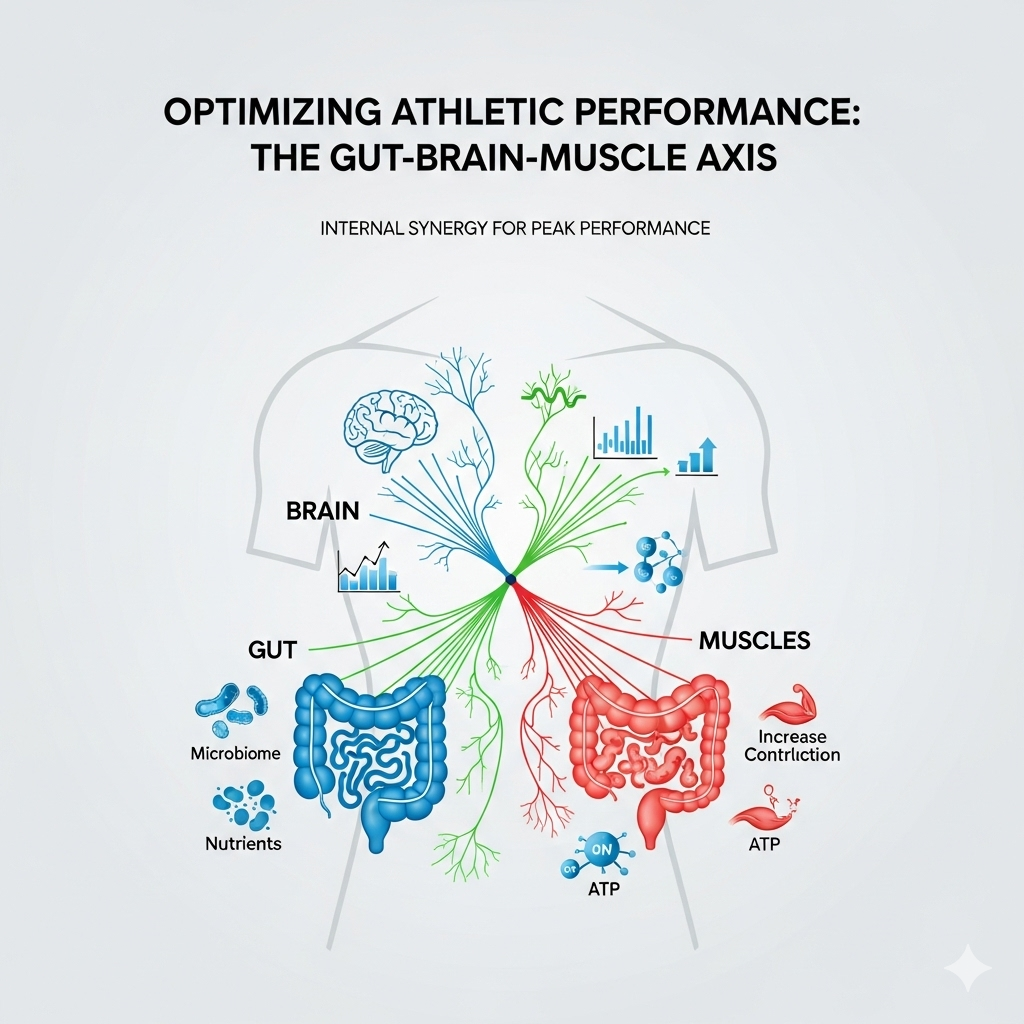In the ever-evolving landscape of fitness and athletic performance, the focus is shifting from isolated training and nutrition strategies to a more holistic understanding of the body’s interconnected systems. One of the most exciting and impactful areas of this new frontier is the gut-brain-muscle axis—a complex, bidirectional communication network that links the health of your digestive system to your cognitive function and physical capabilities. For biohackers and performance-driven individuals, optimizing this axis represents a powerful opportunity to enhance performance from the inside out. This blog post will delve into the science behind the gut-brain-muscle connection, exploring how a healthy gut can translate to a sharper mind and stronger body, and providing practical biohacking strategies to harness this profound link for peak athletic performance.
Understanding the Gut-Brain-Muscle Axis
The gut-brain-muscle axis is not a single entity but a dynamic interplay of neural, hormonal, and immune signaling pathways that connect the gastrointestinal tract, the central nervous system, and skeletal muscle. This intricate network ensures that these three critical systems are in constant communication, influencing each other’s function and overall health.
The Gut Microbiome: The Conductor of the Orchestra
At the heart of this axis lies the gut microbiome—a vast and diverse community of trillions of microorganisms, including bacteria, viruses, and fungi, that reside in your digestive tract. This microbial ecosystem is far from being a passive bystander; it actively participates in a wide range of physiological processes, including:
- Nutrient Absorption and Metabolism: The gut microbiome plays a crucial role in breaking down food components that the body cannot digest on its own, producing essential vitamins and short-chain fatty acids (SCFAs) that have far-reaching effects on health.
- Immune System Regulation: A significant portion of the immune system is located in the gut, and the microbiome helps to train and regulate immune responses, influencing systemic inflammation.
- Neurotransmitter Production: The gut is often referred to as the “second brain” because it produces a vast array of neurotransmitters, including serotonin and dopamine, which have a profound impact on mood, motivation, and cognitive function.
The Gut-Brain Connection: A Two-Way Street
The communication between the gut and the brain is constant and bidirectional, primarily facilitated by the vagus nerve. This connection means that the state of your gut can directly influence your mental and emotional well-being, and vice versa. For athletes, this has significant implications:
- Stress and Anxiety: A healthy gut microbiome can help to regulate the stress response, reducing anxiety and improving mental resilience—critical attributes for high-pressure training and competition.
- Motivation and Focus: The gut’s influence on neurotransmitter production can impact motivation, focus, and drive, all of which are essential for consistent training and peak performance. Research in animal models has even shown that the motivation for long-term physical activity is regulated by gut microbes, not just the brain [1].
The Gut-Muscle Connection: Fueling and Repairing the Engine
The gut’s influence extends directly to skeletal muscle, impacting everything from energy production to muscle repair and growth. A healthy gut microbiome is essential for:
- Nutrient Absorption and Protein Synthesis: The gut microbiome plays a vital role in the absorption of nutrients, including amino acids, the building blocks of muscle. A healthy gut can enhance the bioavailability of dietary protein, leading to more efficient muscle protein synthesis and repair [2].
- Inflammation and Recovery: An imbalanced gut (dysbiosis) can contribute to chronic, low-grade inflammation throughout the body. This systemic inflammation can impair muscle recovery, increase muscle soreness, and hinder training adaptations [3].
- Energy Homeostasis: The gut-muscle axis is involved in energy homeostasis, ensuring that muscles have the fuel they need to perform and recover [4].
Biohacking the Gut-Brain-Muscle Axis for Peak Performance
Optimizing the gut-brain-muscle axis involves a multi-faceted approach that focuses on nurturing a healthy gut microbiome and supporting the communication pathways between the gut, brain, and muscles.
1. Nourish Your Microbiome with a Pro-Gut Diet
What you eat is the most powerful tool for shaping your gut microbiome. A diet rich in diverse, whole foods provides the necessary fuel for a healthy gut ecosystem.
- Fiber-Rich Foods: Prebiotic fibers, found in fruits, vegetables, whole grains, and legumes, are the preferred food source for beneficial gut bacteria. A high-fiber diet promotes a diverse and resilient microbiome.
- Fermented Foods: Fermented foods like yogurt, kefir, kimchi, and sauerkraut are rich in probiotics—live, beneficial bacteria that can help to populate the gut and improve its function.
- Polyphenols: These plant compounds, found in colorful fruits, vegetables, tea, and dark chocolate, have antioxidant and anti-inflammatory properties and can promote the growth of beneficial gut bacteria.
2. Consider Probiotic and Prebiotic Supplementation
While a whole-food diet is the foundation, targeted supplementation can provide additional support for gut health.
- Probiotics: Probiotic supplements can introduce specific strains of beneficial bacteria to the gut, which may be particularly helpful after a course of antibiotics or during periods of high stress. For athletes, probiotics have shown potential in enhancing performance through various mechanisms, including influencing the gut-brain-muscle axis [5].
- Prebiotics: Prebiotic supplements, such as inulin or fructooligosaccharides (FOS), can provide a concentrated source of fuel for beneficial gut bacteria.
3. Manage Stress to Support Gut Health
Stress can have a profound negative impact on gut health, disrupting the balance of the microbiome and increasing intestinal permeability (“leaky gut”). Incorporating stress-management techniques into your routine is crucial for a healthy gut-brain connection.
- Mindfulness and Meditation: These practices can help to calm the nervous system, reduce stress, and improve the gut-brain signaling.
- Adequate Sleep: Chronic sleep deprivation is a significant stressor on the body and can negatively impact gut health. Prioritizing quality sleep is essential for a healthy gut-brain-muscle axis.
4. Optimize Your Training to Support Gut Health
While intense exercise can be a stressor on the gut, regular, moderate exercise has been shown to have a positive impact on gut microbiome diversity and function. The key is to find the right balance and avoid overtraining, which can lead to gut issues.
Conclusion: The Inner Game of Performance
The gut-brain-muscle axis represents a paradigm shift in our understanding of athletic performance, highlighting the profound impact of our internal ecosystem on our physical and mental capabilities. By embracing a biohacker’s approach to optimizing this intricate network, you can unlock a new level of performance that comes from within. Nurturing a healthy gut microbiome through a pro-gut diet, targeted supplementation, stress management, and smart training is not just about improving digestive health; it’s about enhancing your mood, sharpening your focus, accelerating your recovery, and building a stronger, more resilient body. The future of peak performance lies in understanding and harnessing the power of the gut-brain-muscle connection—the ultimate inner game of athletic achievement.
References:
[1] The microbiota–gut–brain axis regulates motivation for exercise – PMC. Pmc.ncbi.nlm.nih.gov. Available at: https://pmc.ncbi.nlm.nih.gov/articles/PMC10264927/
[2] Fueling Gut Microbes: A Review of the Interaction between Diet… Sciencedirect.com. Available at: https://www.sciencedirect.com/science/article/pii/S2161831322005002
[3] The relationship between the gut microbiome and resistance training. Bmcsportsscimedrehabil.biomedcentral.com. Available at: https://bmcsportsscimedrehabil.biomedcentral.com/articles/10.1186/s13102-023-00791-4
[4] Gut Muscle axis – Physiopedia. Physio-pedia.com. Available at: https://www.physio-pedia.com/Gut_Muscle_axis
[5] Intestinal microbiota interventions to enhance athletic performance—a review. Mdpi.com. Available at: https://www.mdpi.com/1422-0067/25/18/10076


